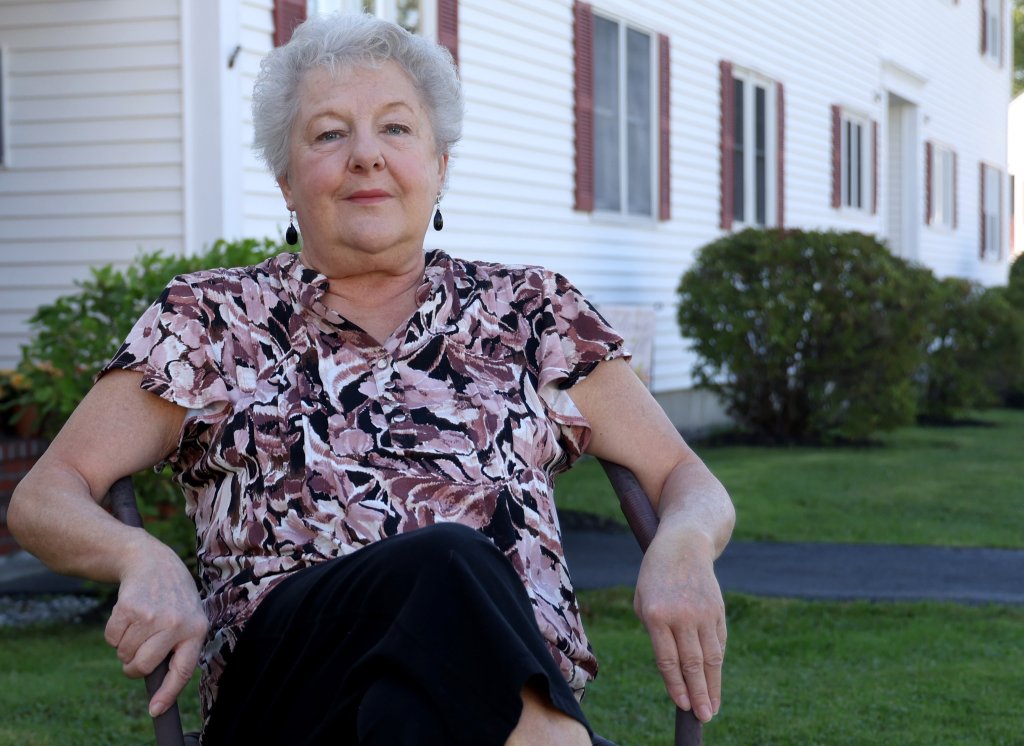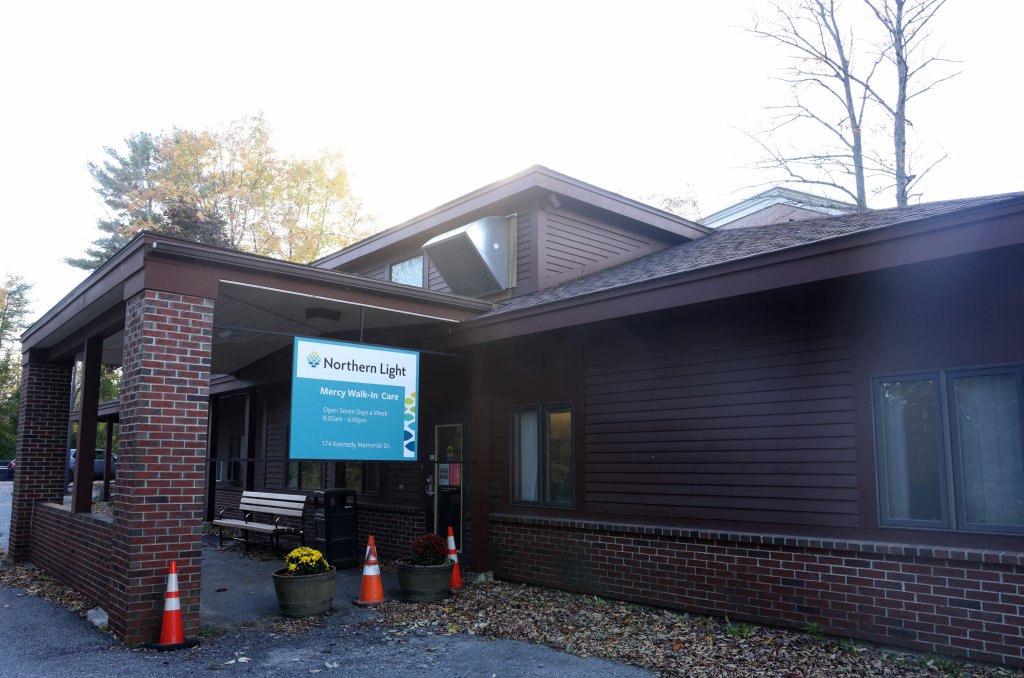
Laurel Nabarowsky receives diabetes care in Bangor, drives to Pittsfield for cardiology and foot appointments, sees a primary care provider in Unity and is on a two-year waitlist for her dermatologist in Brunswick.
She lives in Winslow.
Nabarowsky, 68, used to have closer doctors. Her primary care provider for 25 years was at a Northern Light Health clinic about 15 minutes away in Oakland and, when her granddaughter complained about a tooth infection, they went to the system’s walk-in clinic in neighboring Waterville.
Her doctor’s office closed. So did Northern Light Inland Hospital in Waterville. The clinic is set to do the same.
Nabarowsky said most of her care was in Waterville before the hospital closed. Now, she has to drive about two hours round trip to see some of her doctors.
“It’s a very bad situation, because I’m elderly,” Nabarowsky said. “And as we get older, we don’t like to drive after dark and we don’t like to go distances.”
Residents across central Maine have had to look for doctors outside of their communities, as local health providers, facing financial troubles and staffing problems, shutter or have limited availability. Several primary care offices have stopped taking new patients and are booking appointments months or years out, creating gaps in care that health leaders say will be more costly for residents down the road.
“When we start telling folks that it’s going to be a year or more before we can see you for a visit, they tend to fall off,” said Ed Molleo, director of communications for HealthReach, which has 12 community health centers in central and western Maine.
“And we know that, statistically, that’s likely to lead to poorer health outcomes.”
When Inland closed in June, it took away primary care, specialty doctors and the nearest emergency room for Waterville-area residents.
Northern Light said at the time that it would keep its Waterville walk-in clinic open under the management of Mercy Hospital, which is also part of the health system, to continue providing nonurgent care to local patients. The health system announced in late September that the clinic would close by the end of the year.
Marie Vienneau, Northern Light’s senior vice president and regional president, said in an email this month that the clinic, located at the end of a small road off Kennedy Memorial Drive next to Inland’s campus, has experienced a 40% decline in daily visits since the hospital closed in June, “as patients successfully found new medical homes.”
Molleo said the region’s primary care providers are at a breaking point.
“I think demand,” he said, “is exceeding supply right this moment.”
IMPACT ON PRIMARY CARE

Northern Light Health closed primary care clinics in Waterville and Oakland this year; Central Maine Healthcare announced it was closing its Manchester Care Center at the end of October, and Aurora Healthcare, an independent practice in Fairfield, will close Dec. 1, according to its website.
To address increasing demand since Inland closed, MaineGeneral is working to recruit specialty physicians and recently hired medical staff specializing in ear, nose and throat care, eye care, gastroenterology and physiatry, said Joy McKenna, a spokesperson for the hospital system.
She also said MaineGeneral, which has a hospital in Augusta and an outpatient facility in Waterville, hired five former Inland staff members to meet the increased need for primary care medical staff.
Molleo said HealthReach centers in Belgrade and Albion — the two closest to Waterville — have been overburdened by surrounding closures, causing monthslong waitlists for appointments.
Staff at the Belgrade and Albion locations have begun suggesting that patients instead go to health centers run by HealthReach in Whitefield, Richmond and Madison, but Molleo said driving up to 30 miles farther isn’t possible for some residents.
HealthReach operates community health centers, which are federally designated primary care centers for patients in underserved areas. Molleo said that, of the about 26,000 patients HealthReach serves across central and western Maine, 32% are on Medicare, which is for adults age 65 and older, and 23% rely on MaineCare, the state’s Medicaid program.
The centers provide care on a sliding fee scale, including primary and preventative care for free to people in the highest tier of need, based on household size and income level, Molleo said.
‘IMPOSSIBLE SITUATION’
Federal cutbacks to low-cost health care programs could impact how community health centers are funded and run.
Federal legislation passed this summer made cuts to Medicaid, starting in 2026, which will cause more Mainers to be uninsured. MaineCare is estimated to lose $5.9 billion in federal funding by 2034, Gov. Janet Mills said in a June 25 letter.
The cuts also halted Medicaid funds for some health care providers that offer abortion services, including Maine Family Planning, the state’s largest provider of reproductive health services. Funding was cut for nonabortion services, like primary care and testing for sexually transmitted diseases.
Maine Family Planning said in early October that it would end its primary care services because of the halted funds. The practice served about 800 patients at clinics in Ellsworth, Houlton and Presque Isle — locations the network chose to open clinics because of their limited access to primary care, said Olivia Pennington, the group’s director of advocacy and community engagement.
Pennington said Maine Family Planning is ending its primary care services to protect access to its sexual and reproductive health care services.
“We are in an impossible situation,” Pennington said.
In the same bill that made cuts to Medicaid, the federal government designated $50 billion in rural health funding to be split among the states. Maine will receive about $100 million each year for the next five years and must apply by next month to be eligible for the second round of funding.
‘FALLING THROUGH THE CRACKS’
Nabarowsky, who was disappointed to hear the Waterville walk-in clinic was closing, finally got off the waitlist for a primary care provider in Unity.
It’s not a doctor she’s gone to before, but she said that seems to be the new normal.
Nabarowsky had triple bypass heart surgery four years ago and is supposed to see a cardiologist every six months to check for clogged arteries, but she wasn’t able to get an appointment until eight months past her last checkup.
Doctors she’s seen for years, including a diabetes specialist in Bangor, are also booked out until next year, she said.
“I can’t even see my doctor,” Nabarowsky said. “It’s kind of scary.”
She said she isn’t sure what the future will hold for older adults, given the cuts.
“I really don’t know what the answer is, but I know that we can’t go without care,” Nabarowsky said. “The elderly are falling through the cracks.”

We invite you to add your comments. We encourage a thoughtful exchange of ideas and information on this website. By joining the conversation, you are agreeing to our commenting policy and terms of use. More information is found on our FAQs. You can modify your screen name here.
Comments are managed by our staff during regular business hours Monday through Friday as well as limited hours on Saturday and Sunday. Comments held for moderation outside of those hours may take longer to approve.
Join the Conversation
Please sign into your CentralMaine.com account to participate in conversations below. If you do not have an account, you can register or subscribe. Questions? Please see our FAQs.